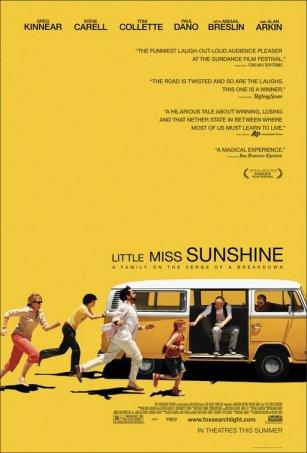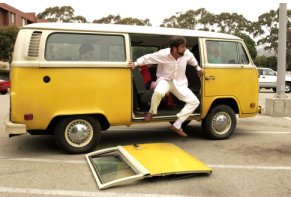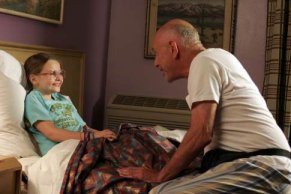|
Little
Miss Sunshine To
dismiss Little Miss Sunshine as simply a formulaic
family road movie would be naïve, and yet one cannot
ignore that the film adheres to its formula driven roots
a little too faithfully at times. It’s not the use
of formula, but what you do with the formula, and screenwriter
Michael Arndt along with co-directors Jonathan Dayton and
Valerie Faris appear to be aware of this distinction.
Their focus is
trained on the human disposition of failure rather than
the tenets of a family growth narrative intertwined with
a road movie premise. The possibility, fear of, and realization
of failure is something that grips everyone to various degrees,
and anyone that says otherwise is lying through their teeth.
The film centers
on the rag-tag Hoover family, a gang of, for lack of a better
word, losers. Each of the Hoovers exhibits a different degree
of failure in their personal lives, and each one struggles
individually and collectively to either except or overcome
this feeling.
Olive Hoover
(Abigail Breslin), the youngest of the pack, has only one
goal in life – to win a beauty competition. Her brother
Dwayne (Paul Dano) wishes to be a fighter pilot, and has
designed a strict daily workout to condition for the task.
Inspired by Nietzsche, Dwayne has taken a vow of silence
until he achieves his goal, and resorts to carrying around
a pad of paper and pen to communicate.
Grandpa
(Alan Arkin) is coping with feeling that the bulk of his
life is in his past, so after being kicked out of his retirement
home, he has taken up training Olive for her beauty contest
performances while secretly snorting heroin to numb the
pain.
His son Richard
(Greg Kinnear) has his whole life ahead of him, but squanders
it away with his obsession over “winning.” Richard
has developed a plan for success titled “The 9-Steps
to Winning,” and he not only preaches the doctrine,
but to the chagrin of his family, lives the program as well.
Richard lives
in a world in which he perceives himself to be succeeding,
but refuses to realize that his boat is sinking with his
family aboard. Failure is one thing, but to be the last
to know about it is another. He hides the truth from himself,
and others, further deluding and obscuring reality with
each fib he tells.
Sheryl’s
(Toni Collette) dealings with failure are less obvious than
the others. Her feelings of inadequacy stem from her inability
to hold everything together. Repeat fast food fried chicken
dinners, and statements like “You’re the mom,
you’re supposed to protect her” cut her deeply,
and the fact that her brother Frank (Steve Carell) has recently
attempted suicide doesn’t help the matter.
Frank, as it
turns out, is “the world’s leading Proust scholar,”
but he isn’t initially perceived as such. Our introduction
to Frank follows his release from the hospital, and we are
given the feeling that this isn’t his first attempt
at killing himself. Whether or not that is true remains
unexplored, but it becomes irrelevant in the end.
This
is all setup, and these tics and subplots all come to fruition
throughout the film. Some are more obvious arcs, as you
may be able to tell from the setup above, but for the most
part the importance isn’t in the obvious nature of
the pending arc, it’s in the execution.
Dayton and Faris
have a knack for making one feel uncomfortable with each
obvious turn. There were several moments in the film, one
that pre-empts the beginning of the third act specifically,
that left me contemplating whether or not the film would
ultimately work for me.
Overall, it does,
but it is to the credit of the subtle character work, acting,
and the inference of subtext. For instance, Grandpa’s
insistence that Dwayne get laid more as a 16-year-old boy
is absurdly and awkwardly funny. Richard’s objections
to the brash discussion of sex, despite Grandpa’s
insistence that Olive’s headphones allow them to speak
frankly without her hearing, are hilarious and well timed.
This diatribe
could have been played for nothing more than laughs, but
instead it segues into a sequence at a diner in which Olive
decides to order a bowl of ice cream, and Richard obtusely
re-enforces the constraints society places on young women
in regards to beauty and their bodyweight.
As crude
as Grandpa’s delivery was, his rant about sleeping
with as many women as you can exhibits the underlying message
of living life to its fullest before it's too late. Richard
defends womankind by objecting to discussing this truth,
yet re-enforces the sexist undertones of Grandpa’s
diatribe in the diner to the very person he was attempting
to protect to begin with. Ultimately, he doesn’t want
to see Olive lose, but he goes about this the wrong way
and for all the wrong reasons.
These characters,
although they get stuck doing some pretty outlandish stuff,
are ultimately performed and written as real people. I have
a few issues with some of the more convenient beats in the
film, but ultimately it retains a comedic feel while never
fully shying away from the dramatic entanglements of reality.
The performances here are all exceptional, so much so that
it almost feels wrong to single anyone out.
The
themes are heavy at times, but the important thing is they
are never heavy handed. They may come to fruition in a convenient
or obvious fashion, but the film never preaches. In fact,
these themes sink in over time.
Following
the screening I couldn’t formulate a gut reaction,
and found myself reflecting afterward, internalizing much
of it, and even embarrassing myself with simple oversights
and mistakes while leaving the parking garage and pumping
a tank of gas.
The
funny thing is, the more one dwells on failure, the more
frequently they tend to fail. Someone should have probably
told Richard this sooner in life.
Rating:

|








